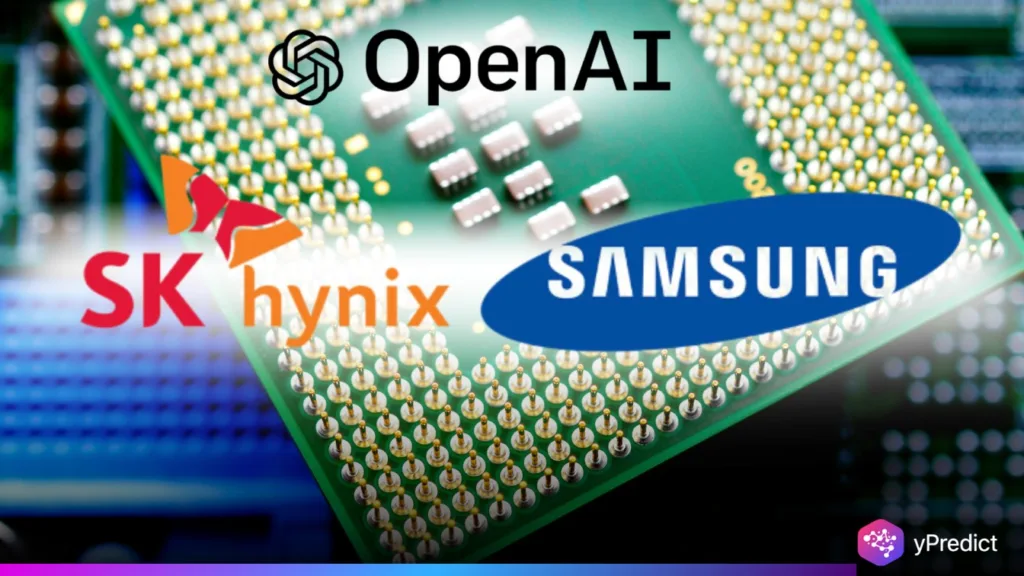
Open AI Deal Accelerates Chip Demand, Sends Markets Soaring
In a stunning development reported earlier today, OpenAI has inked a billion-dollar deal. This was done with South Korean chip manufacturers Samsung and SK Hynix. To provide high-end memory chips for its sprawling “Stargate” AI datacenter initiative. The announcement triggered a rally in the market. The shares of Samsung rose about 4.7%, while SK Hynix stocks jumped roughly 12%. This took their combined market cap up by about US$37 billion.
The KOSPI, South Korea’s key benchmark index, also responded by surging more than 3% to new highs. That rally highlighted investor trust in the burgeoning demand for memory chips related to AI infrastructure.
Samsung Steps Into the AI Arms Race
Samsung is already a big fish in the world of memory chips and electronics. It considers the OpenAI deal as an opportunity to extend further its role in the AI hardware ecosystem. SK Hynix is typically considered the dominant player in high-bandwidth memory (HBM). But, Samsung is slated to back the agreement via multiple partnerships across its subsidiaries. This would potentially include floating data centre technology. As well as building efforts tied to OpenAI’s expansion plan.
The commitment represents up to 900,000 wafers a month from OpenAI’s Stargate chip partners. It would be on such a scale that it has the potential to rearrange supply chains. As well as force the global memory business into a rapid capacity expansion.
Samsung’s stock has soared on a bet. Its AI chip orders will be stronger, and the company is now trading near highs not seen in over four years.
SK Hynix: From Memory Leader to AI Enabler
It has been a stalwart memory player, with many praising its prowess in high-bandwidth memory modules. These are used in power-hungry computing workloads. Following this OpenAI arrangement, SK Hynix will enhance its production capabilities to fulfil the unprecedented demand surge. It has also started discussions to jointly build “Stargate Korea” AI data centres with SK Telecom and OpenAI.
The all-time high in SK Hynix’s share price reflects investors’ positive view. The company is becoming the backbone provider of the infrastructure for large AI models. The increasing demand could alleviate worries that memory chip prices were heading south on the back of oversupply, analysts said.
Broader AI Implications and Geopolitics
But this is not just a chips-led deal by OpenAI. It shows how AI is reshaping global technology supply chains and partnerships. For South Korea, it will strengthen its position as an AI hub. But there’s also a geopolitical angle. OpenAI’s Stargate project is supported by U.S. interests. And the co-operation could complicate the U.S.-South Korea trade talks and semiconductor regulations.
The correlation between AI and chip demand has started to emerge. Some computing-heavy applications, such as large language models and generative AI, are becoming more commonplace. These require more infrastructure. OpenAI’s push is further ramping up that hardware demand. And its choice of chip partners says a lot about who will be the biggest winners in the new AI economy.
The Future of AI Chip Partnerships
The OpenAI chip pact is ushering in a mindboggling leap in market value for Samsung and SK Hynix. This adds about $37 billion to their combined valuation. An agreement that originated in a memory-chip supply deal is already altering how investors think about the companies. How industries strategise, and even how AI infrastructures evolve. To Samsung, this deal represents an opportunity to expand its influence in AI hardware beyond the conventional semiconductor sectors.
It strengthens SK Hynix’s lead in memory designed for high-end computing. And now that is more important than ever for the AI ecosystem. Especially in a world where the stakes of capturing compute and memory capacity at scale are skyrocketing. The full effect will play out over the years. But today’s spike is a sign of how deeply intertwined OpenAI, chip companies, and the prospects of AI infrastructure have become.





